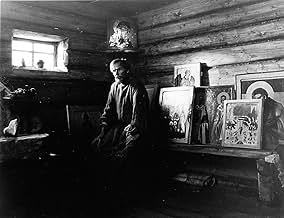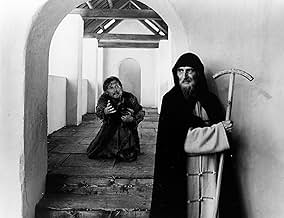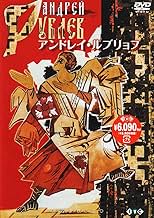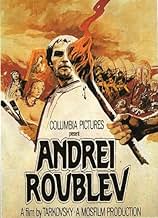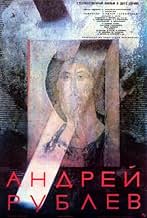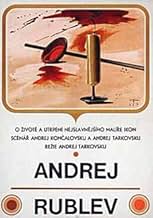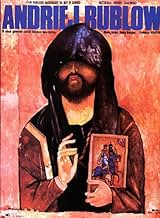Leben, Zeit und Leiden des russischen Ikonenmalers aus dem 15. Jahrhundert.Leben, Zeit und Leiden des russischen Ikonenmalers aus dem 15. Jahrhundert.Leben, Zeit und Leiden des russischen Ikonenmalers aus dem 15. Jahrhundert.
- Regie
- Drehbuch
- Hauptbesetzung
- Auszeichnungen
- 4 Gewinne & 1 Nominierung insgesamt
- Durochka
- (as Irma Raush)
- Patrikey, monakh
- (as Yu. Nikulin)
- Skomorokh
- (as R. Bykov)
- Stepan, sotnik Velikogo knyazya
- (as N. Grabbe)
- Foma, monakh
- (as M. Kononov)
- Starshiy liteyshchik
- (as S. Krylov)
- Tatarskiy khan
- (as B. Beyshenaliev)
- Aleksey, monakh
- (as A. Obukhov)
- Sergey
- (as Volodya Titov)
- Efim
- (as N. Glazkov)
Empfohlene Bewertungen
The medieval society was deeply religious. The church influenced every aspect of people's lives from birth to death and was part of the state. It means religious leaders were as important as rulers.
In Russian society men were wearing beards and women covered hairs. Remove a beard from a man or uncover woman's hair and you will humiliate them, they would feel like modern people being undressed in public.
Paganism is a form of religion, where people believe in many gods instead of one. The main Russian pagan gods are the goddess of the earth and the god of the sun. Among others - the god of storms and lightning, the mythical young women living in forests and rivers. Despite many centuries of suppression of paganism by authorities some in modern Russia still celebrate the feast of Ivan Kupala (which could be translated as Ivan Gathering) depicted in the movie.
Also I have to mention, that Soviet censors told Tarkovski the movie is too cruel. They told him the scene with a burning cow, for example, is absolutely unacceptable. Tarkovski tried to defend the movie. The cow wasn't harmed, was his reasoning. Still the film was cut. The censors knew better what is good and what is not for the viewer.
This brings us to what is the message of Tarkovski in this film. There are many messages actually. I'll be telling only about one here, because it is not hidden. It is there, in the dispute between Rublov and Theophanes The Greek. They both are talented, both want to bring people to humanity. Theophanes is tired, he says - common people live in darkness, they are completely consumed by sin and the only way to make them humans is to scare them and punish them. Rublov advocates for love. He says: people live very difficult life, it's amazing how they endure it. We have to love them, to remind them, they are humans, they are Russians. You see, the first is the position of the Soviet system, the second - of Jesus Christ.
Me? I'm still sitting on the fence. :)
I recommend to watch this movie many times. You will do it without my recommendation though, if you (like me) will not understand everything from the first view and you like to think. The mesmerizing beauty of this movie will help you to return easier. For the first time be prepared for not a cakewalk. There are two things to consider here. One is the cruelty. Though it is absolutely necessary in this film, most of us living in a comfort of modern society are not ready to it. The other is the pace. Often it is a pace of real life.
Peace.
But there is another thread, one that eschews selfaware structure -- where idea is anathema. Nature is celebrated. Rich intuition and meditative spontaneity are sufficiently nutritious in some hands, but these are amazingly few. The so-called 'new wave' tried it, at least initially. Lots of other appearances as well, mostly failures, some lovely. Among the attempts, I know of only two filmmakers who have mastered this tricky approach of avoiding knowledge: Tarkovsky and Malick. Of these, Malick is more abstractly sensual.
After all, Tarkovsky must deal with that dark cloth of Russian self-pity, that tradition of grand themes and epic fate, something which does not burden Malick. So the metaphoric content is heavy. That's fine, an acceptable skeleton for a nearly three hour meditation. All is self-referential: a set of images about an imagemaker: the actor's wife played the retarded girl who factors so importantly. During the production he was cheating on her with who was to become his second wife. The girl goes off with a Tartar, leaving Rublev. Many other scenes refer to Rublev's situation, resolved by Tarkovsky's action. For instance, we have a sequence where Rublev hesitates to paint a scene of fateful pain. This is followed by Tarkovsky doing just that. The extension of metaphor among parts of the film (ballooner and bellringer to Rublev's story) extends from the film to the filmmaker and thence from him to us.
What I found even more interesting was his confidence in complex compositions and long, long multiperspective tracking shots. Compared to other swoopers, this camera seems curious, impetuous, not at all as if the shots were planned. Hard to believe it is only his second feature. This alone expands one's imagination with only a couple viewings, but combined with the notion of folded metaphor (including visual metaphor) it becomes a truly great and singular work.
(Some classical symmetries touch multiple places: a jester within the play; solitude in the context of relationship; creating in the unknown; broken symmetry through one twin killing another. Some new ones: pagan fire and water underlying ritual exuberance, either sex or religious art.)
Alas, the DVD has a discouragingly vapid commentary. But then I guess that's the whole point, and with the loss of potatohead Soviets, we need to substitute the next best thing.
Tarkovsky wanted to make art that would change people's lives and in this he succeeded. Although his life was troubled and his projects clawed into life randomly from the grip of his film studio bosses, when viewed as a whole they seem to be all part of some great plan that was meant to reach fruition right from the start. He believed that ultimately it is best to do things that deepen one's inner life rather than impoverish it. That may explain why you leave most Hollywood films feeling soiled. There are too many great scenes and moments in this astonishing and monumental work to mention so I won't. Suffice it to say it would have been fascinating to have seen what Tarkovsky would have made had he lived and returned from exile to his homeland. Recent events in Russia and the Balkans make this film even more vital and pertinent today.
The trouble is Tarkovsky's films have such extraordinary purity and spiritual depth that no other films seem able to satisfy one in the same way. They seem flat, lifeless and unable to compete. Why watch the let's-pretend-grown ups like Tarantino when you can watch a real grown up? So like I said, Bloody Tarkovsky. He has ruined cinema for me.
A bit difficult to review this movie. It is clearly the work of a master craftsman: the exquisite cinematography, the sheer scale of the subject matter and time period, the themes, the obvious adoration director Andrei Tarkovsky has for his subject.
Yet it is often quite a grind to watch: clocks in at well over 3 hours and moves very slowly. Several scenes will go by without development in plot or theme. Furthermore, the separate time periods don't necessarily form a narrative. They often just feel like things happening, with no connection between them.
While acknowledging that the film is well made, I fail to see how it is so highly regarded. I did not come away feeling that I had just watched a masterpiece, something incredibly profound or moving.
Wusstest du schon
- WissenswertesFilm debut of Anatoliy Solonitsyn, and the first of four movies he made together with director Andrei Tarkovsky before his death from cancer in 1982. Had Solonitsyn lived, he would also have played protagonist Andrei Gorchakov in Tarkovsky's Nostalghia (1983), as well as star in a project titled 'The Witch' which eventually became Tarkovsky's final production, Opfer (1986).
- PatzerThe smoothly-cut logs that feature many times in the early scenes are clearly cut with machinery not available in the early fifteenth century.
- Zitate
Andrei Rublyov: You just spoke of Jesus. Perhaps he was born and crucified to reconcile God and man. Jesus came from God, so he is all-powerful. And if He died on the cross it was predetermined and His crucifixion and death were God's will. That would have aroused hatred not in those that crucified him but in those that loved him if they had been near him at that moment, because they loved him as a man only. But if He, of His own will, left them, He displayed injustice, or even cruelty. Maybe those who crucified him loved him because they helped in this divine plan.
- Alternative VersionenSoviet television created a severely trimmed 101-minute version that the director did not authorize. Notable scenes removed from this version were the raid of the Tatars and the scene showing naked pagans. The epilogue showing details of Andrei Rublev's icons was in black and white as the Soviet Union had not yet fully transitioned to color TV.
- VerbindungenEdited into Ombres vives ...une autre histoire du cinema... (2013)
Top-Auswahl
- How long is Andrei Rublev?Powered by Alexa
Details
- Erscheinungsdatum
- Herkunftsland
- Sprachen
- Auch bekannt als
- Andréi Rublev
- Drehorte
- Produktionsfirmen
- Weitere beteiligte Unternehmen bei IMDbPro anzeigen
Box Office
- Budget
- 1.000.000 RUR (geschätzt)
- Bruttoertrag in den USA und Kanada
- 124.189 $
- Eröffnungswochenende in den USA und in Kanada
- 11.537 $
- 15. Sept. 2002
- Weltweiter Bruttoertrag
- 180.956 $
- Laufzeit
- 3 Std. 9 Min.(189 min)
- Farbe
- Sound-Mix
- Seitenverhältnis
- 2.35 : 1


